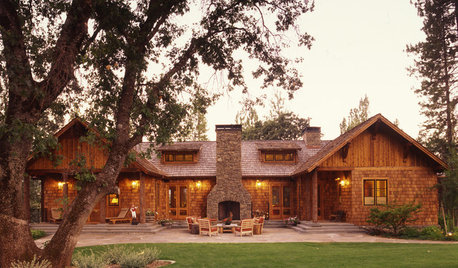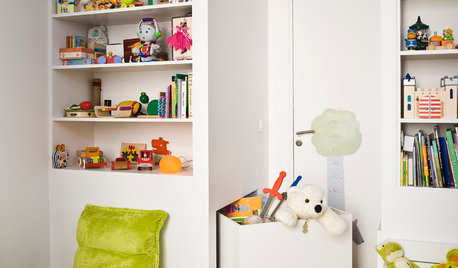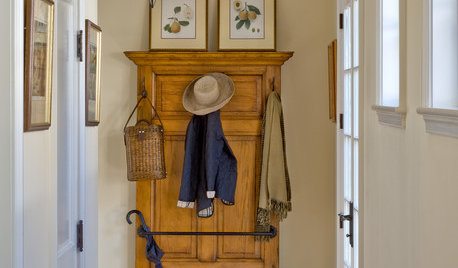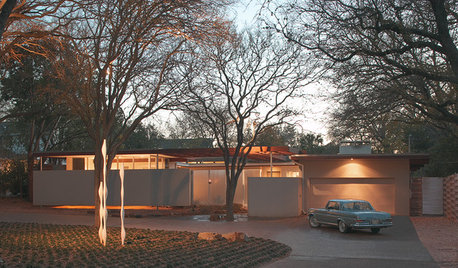Lessons learned from your build?
For those who are well-into or finished with your builds, would you mind sharing your greatest learned lesson? Something you wish you had known before starting the process?
Comments (50)
Joseph Corlett, LLC
4 years agoYou have little leverage over builders, general contractors, and subs once you start. Nothing bad happens to them when they don't meet deadlines and they know there isn't really anything you can do about it, especially in this hot economy.
beckysharp Reinstate SW Unconditionally
4 years agoThe Building a Home archives are a wealth of information. And if you use any of the GardenWeb/Houzz forums, you will get so much more if you go in with an open mind rather than fixed, inflexible ideas (or wanting a pat on the back for your plans).
WestCoast Hopeful
4 years agoDon’t assume anything will ever be done the way you want it to, even with plans, be there and check often. If it isn’t done as you want don’t sit on it and get it changed.
Make sure your expectations are clearly communicated on the things that matter to you. When we built the initial part of the build we were asked hundreds of questions about minuscule things that really don’t matter. As the build went on and things happened quicker we stopped being asked important questions like the lay out of hardie panels on back of house or height of lights in rooms. All of this was in plans but ignored by subs who did what they thought was best. Huge headache to fix later.
Don’t let them get away with statements like “we always do it this way”. It’s BS and it’s your build. You are paying them and you do have say
hemina
4 years agoFind a contractor that you trust and works in a similar style to how you operate. And verify by seeing what they’ve done recently and talk to people who’ve worked with them recently. Talk to vendors and subs that have worked with them. You find out a lot by visiting local vendors and just asking about them. I heard a lot of ‘oh Joe? He’s a great guy. I’ve worked with him for tile for 15 years!’...
Plan out the details-or have someone else do it if you can’t- and have good communication on both sides. My contractor never assumed anything-he asked for very specific details about everything: electrical outlets/fixtures; specific color names/sheen; exact tile placement drawing or notes; what directions doors opened/sliding windows operated; heights of bath fixtures, exact location of pulls on cabinets...too much to list. I’d have to specify everything in detail.
He’d give me a list to say what was coming up next so I could get going on research and then be able to give me the list of details (or finish items) he’d need to keep things going on time. We also had to buy almost everything that was a finish item (except for tile/stone), so timing to get what we needed was very important. That worked for my control freak tendencies!
It made me stop to really think about each detail and I enjoyed that. But learned that I should have had a lighting designer come in for the electrical details. That was a bit over my head for the first time attempt!Good understanding of how payments will work. Mine billed at the end of each with with exactly what was completed. His work was estimated in detail and was sorted in timeline order: eg concrete for foundation was listed separately from concrete for driveway. If he didn’t do something, he wasn’t going to get paid. He didn’t ask for money up front (other than $1000 deposit which wasn’t even a drop in the bucket of this giant job).
Plan on having the job taking longer and costing more that you thought. We were lucky in that we were given a 6 month timeline and got into our house at 6.5 months. So our over-budgeting for rental costs came in handy! I had listed out a weekly timeline at the beginning based on our conversations and he came back with specifics on each step of the job (attached pic) and we got pretty close to that timing.

User
4 years agoPay for good design up front or mistakes and miscommunication later. Good design only seems expensive. Until you start down the change orders and overages path.
WestCoast Hopeful
4 years agoI would add meeting the site supervisor is key. Knowing who will be there on a regular basis and confirming they match your style. They are more important than the project manager as they are your eyes on the ground.
Plan as much as you can ahead of time so you know where you can cut back if you need to. We had all our finishes specked and priced in advance so when framing went over budget we tweaked a ton of finishing things and recouped a decent amount. Not a wash at all but it helped
Flo Mangan
4 years agoThere are so many ways things can get messed up the best method as stated above is outline in detail every single detail you can. Develop spreadsheets to track and help when changes are needed. I can guarantee there will be problems. Just fix in your mind “what can I get back from this error?” Remember, THE CONTRACT is the controlling document so get as much detail in it as possible. READ CONTRACT in detail and make sure you understand who does what and who pays for each element. Labor for installation of things like flooring and tiling are often left unclear and result in big surprise costs. Details details.
Lou Myers
4 years agoGet what you want within your budget. Comparing 2 faucets side by side, you may favor one over the other, but remember you won’t be comparing side by side in your finished home.
Think ahead. If you have a pet peeve, let your builder know ASAP so it may be avoided. Mine was the fridge sticking out too far from the cabinets. Had DH not had framing reworked prior to drywall, I would have not thought about this until the fridge was going in.
Expect delays. Life and weather happen.
Don’t forget during the stress to be grateful for the opportunity to build and focus on the joy you will have in your new home.
Have fun and enjoy!
Kristin Petro Interiors, Inc.
4 years agoI work on a number of new builds at any given time. All good advice above. Another one is to learn how to read a floor plan. In order to know what you are getting, you need to have at least a basic understanding of your floor plans and elevations. This will give you the knowledge to ask the right questions before anything is built.
Flo Mangan
4 years agoLynn- I have worked many new builds and have developed a checklist of items to understand when contemplating building. Email me at manganflo@gmail .com and I will happily email it back to you.
Bruce in Northern Virginia
4 years agoWe are finishing out a fairly small addition, so not on the scale of an entire house, but I have found that the most frustrating part of the build has been the schedule for final finishing.
When rooms have drywall and paint and you can see all the plumbing rough in, you mentally think its near completion, but there is so much left that has to be done in sequence, and you can't easily push the schedule. For example, finished flooring goes next (some tile, and some wood), then thresholds, then built-in cabinets and tile in the showers, then baseboards and window molding (which take multiple coats of paint, nail hole filling, caulking, etc.), and finally plumbing and lighting fixtures.
Most of these finishing items are relatively simple, easy to understand tasks, but contractors want to do it in stages for each type of work. For example, its unlikely that your contractor wants to deal with deconflicting work-space in real time, so the plumber may not be called until all the rooms are completely ready for plumbing and everyone else is out of the way. The task holding up your finished plumbing may be as simple as a cabinet that didn't come in time, which means you can't finish the baseboard in the bathroom behind the commode or sink, so the plumbing work is delayed.
Bruce
functionthenlook
4 years agolast modified: 4 years agoWe were our own GC. We subed out the foundation, framing and shell. We did the inside ourselves with help of family and friends in the various trades. We didn't have the headache of not following the plans. The only advice I can give is subs have their own schedule and it might not fit yours. Also they really appreciate donuts, drinks and such.
kriii
4 years agolast modified: 4 years agoEven if the floor plans look good, take a tape measure and actually measure the room sizes out. What looks good on paper may end up too small in real life. Thank goodness my husband did this. We were able to add crucial footage to our rooms before the plan was finalized. Leave some extra in the budget for surprises or changes you decide to make. Even though we did this, it was still surprising how much we spent. Within reason, listen to that little voice in your head when it says to spend the extra money to make something more convenient. That 2K I saved putting some lower cabinets in my kitchen would have been better spent on all lower drawers rather than partial drawers. Guess which storage I use and which storage I avoid? Read up on everything. You will learn a lot and get some good ideas. I read somewhere on garden web to put shower controls on the opposite wall as the shower head. Every single day I bless whomever posted that suggestion, since I hate getting sprayed by cold water first thing in the morning. Take your time making decisions so you get them right. Good luck.
Fsal
4 years agoHaving an interior designer is invaluable. It will save you lots of money in the long run.
cpartist
4 years agoFind a builder who's been in business since BEFORE the recession. Make sure they are solvent. Check for liens against them. Bankruptcies. Ask at their favorite lumber yard if they pay on time.
Best advice? Have a CONSTRUCTION LAWYER look over your contract before you sign anything.
Do not have allowances. Pick everything in advance and get it priced out before you sign your contract.
If your house is custom, work with an architect and not a draftsman. Build a house that works for you. Not one you have to adapt yourselves to the house. Good design will definitely trump poor design in liveability.
Ask to see some of the builder's houses in progress. Early progress showing the bones of the house. Not the pretty stuff.
If your architect isn't doing so, at the start of your build, hire your own inspector to come in and check periodically to make sure things are being done according to the plans.
If it's a custom house, make sure the supervisor is only working on 2-3 houses at a time. I wound up supervising a major part of my build because our builder thought it was ok for the supervisor to supervise 8 houses and they were all in different areas of town too. So windows were placed wrong. Floors were not level and had to be redone. In fact almost everything in my build had to be redone because of poor supervision.
If you're not good with design, hire a kitchen designer and an interior designer. Trust me architects are not kitchen designers.
WestCoast Hopeful
4 years agoDepends what they include/not include and how it is all factored in. We had a cost plus contract and had a budget that we worked off that showed the predicted costs of things. This was all based on actual bids to do work but by the time we started building some changed. There were two times where this negatively impacted us because the change was huge in excavation and framing. The builder should have been more conservative with those areas. Similarly he grossly misjudged the cost of hardwood flooring and counter tops because we didn’t initially clarify what type of product we wanted. Luckily this was caught once we had all our items selected, pre building anything, and we were able tot weak other areas and strike a balance.
cpartist
4 years agolast modified: 4 years ago@cpartist what are the disadvantages of allowances, if you don’t mind explaining. Our GC normally does this with his contracts, so I’m curious.
Builders make it a habit of grossly underestimating allowances. Most base it on the most builder basic stuff. Stuff you most likely wouldn't want in your house. So then it comes time to pick and you're hit with a huge change order. They do this so you don't faint when you see what the cost is to build the house.
For example, just making up numbers here.
Builder allowance for all cabinets in kitchen and baths is $15,000 which might work if your kitchen is one wall, your vanities are no larger than 30" and you're doing Ikea cabinets or stapled together cabinets. Where in reality, if your kitchen is a real sized kitchen and you want a double vanity in your bathroom and you don't want your cabinets stapled together, you'd be more likely to spend $35,000 for the cabinets.
So then the builder doesn't just charge you and additional $20,000 for the "upgrade", but instead tacks on his profit which depending on the builder can be anywhere from 20% - 40". So an additional $4000 - $8,000 just to get something halfway decent. And in reality, some builders will tack on the percentage to the full cost of the cabinets, versus just the upgrade price, so that would add $7,000- $14,000.
kel_kat5
4 years agoWe only did a kitchen reno, but I learned lots:
(1) The kitchen sink really is a big deal. I am glad I went with a large single, but would possibly go one size smaller to have more space around it. Farmhouse sink was an option, but I like having the countertop across the front edge or our large, stainless sink.
(2) We had to choose overhang on counters and I made a mistake with too much overhang in one spot. I would not do more than the standard in the future.
(3) Too many potlights in our living room. I would go with less if given the option.
(4) I really like our flat ceilings and I am glad we spent a bit more on flat, rather than choosing Californian.
(5) I went against the popular vote and did what I thought would work for us on some of the design decisions - and it all worked out.
devonfield
4 years agocpartist - What if you pre-priced everything to get actual decent allowances? I am working on a project now for a Q3 2020 start. I am doing a cost plus with max price guarantee and builder bonus. To get the max price determined, I was going to use allowances for certain materials that are pre-determined but realistic. I was concerned about having certain fixtures specified in the contract not be available at build time and then get hit with a change order fee for switching out for a specified product that is no longer available.
Steve OnaRiver
4 years agolast modified: 4 years ago@devonfield, Can you explain the "builder bonus"?
devonfield
4 years agolast modified: 4 years agoI have a 50k difference between the contract cost price and the guaranteed max price. Basically the builder will have the ability to earn 20% or up to 10K of the second contingency 50K we don't use on top of his flat builder fee. Its designed to be an incentive to keep the budget under control and not use up the additional contingency just because its there.
Flo Mangan
4 years agoWho determines “cost”? Builder? What if he gets annual credit for purchasing a set amount of merchandise? Is cost based on retail price or builder wholesale price? Make sure you have everything defined in detail in the “contract”. Also, understand the “incentive”. Will quality suffer?
Kate E
4 years agoREAD everything thoroughly. EVERYTHING. Contracts, emails, texts - read it all carefully. Ask LOTS of questions! You won't know unless you ask - and chances are, your builder may only ask YOU something if it's an option between standard & upgrade. He/She is not going to tell you every minor thing and ask you if you like it or want something different - in my experience they're going to do what they always do - unless you make it known in what areas you wish to make changes/possible upgrades, etc. So ASK about anything/everything.
Get everything in writing. When you sit down and make edits to a floor plan, or make changes to a budget, or heck - make any decisions at all - communicate to your builder that you'd like a written summary/mock up/etc of all decisions made, and dated. This will help later when you can't remember if you changed something or not - you'll have a written record of what was decided & when. (And bonus - your builder will too.)
Also yes - this site is full of people with expertise and loads of experience - let them help you!
Aside from the building/financial aspects...1. Have some form of stress relief (run, walk, read, meditate, yoga, whatever you do - you'll need it.)
2. Communicate often and clearly with everyone! (This includes the builder, your spouse or significant other, family, etc.) It's very easy during a build to get sucked into the vortex of it and lose track of all else.
3. Take TONS of pictures. It will be great to have photos to remember the build... and photos may come in handy later!
4. HAVE FUN! :)
Mrs Pete
4 years agolast modified: 4 years agoTHE CONTRACT is the controlling document so get as much detail in it as possible
This may be the most important sentence in this thread.
Whatever you talk about with your builder may or may not happen, but what you have in writing will happen.
What if you pre-priced everything to get actual decent allowances?
If you've chosen specific items and have priced them, you don't have "an allowance". You have line items. An allowance might be, "stainless steel kitchen sink costing up to $300" ... a specific item is the Kohler Prolific 33" work station at $799 (Amazon). The "any old sink" for $300 is an allowance, whereas the Kohler workstation is a line item /not an allowance.
If you're pre-pricing things, you're on the right track.
Flo Mangan
4 years agoIn my “Checklist” I emphasize the “contract” because typically a buyer isn’t presented this until ready to sign. I always have folks get a “sample” copy in advance because it takes a lot of time to review, comprehend and clarify all aspects. Most have sections where you agree to settle disputes with “Arbitration”. If you can’t resolve problems you are agreeing to paying for a third party to resolve disputes. They work hard to split the baby. It is not a fun process. An Arbitrator is not your “advocate”. Allowances are simply “placeholders” and can be unrealistic hence requiring more cash than anticipated.
Denita
4 years ago^Agree 100% with Mrs Pete and Flo above
Take your contract to a construction attorney that represents consumers/buyers, not builders for review before you sign. They will see things you don't see.
T Hill
4 years agoPlan your furniture placement BEFORE you install floor vents, central vac outlets, electrical outlets and climate control sensors and choose which way the doors will swing open. Determine where you will use kitchen appliances and place electrical outlets there. Choose a kitchen sink deep and wide enough to fit your largest dishes. Drawers on bottom cabinets are worth the extra expense. Don’t install plantation shutters on windows that open to the inside for easy cleaning (really wish we had thought that through). Install outdoor water hose bibs everywhere you even THINK you might need one. Insulate all interior walls. Do not allow any wasted space, even a small nook with a narrow door is useful, (think central vac hose and attachments, Christmas decorations, etc. We actually put a door and closet under a set of stairs and that is where my Christmas tree slides in and out.) Visit the job sight frequently and make yourself available for questions from all the subs.
And last but not least be assured that everything will not go exactly as planned and you will still love your new home. Good luck!remodeling1840
4 years agoBefore we started, we faced each other, held hands, and said aloud, “ I love you, I want to be happily married to you when this is over, I want to get the house of our dreams, and we want to remain friends with our contractor.” Since we were in construction as subs, we knew many of the pitfalls ahead of time, so I was at the job site every day. EVERY DAY. I was polite and respectful, but firm in my interactions with subs on my job. I do know how to read a tape measure and plans and double checked work on my house. I am dead serious about the hand-holding pledge to each other. It was probably the most important thing we did.
bry911
4 years agoI believe the key to a successful build is find a good contractor who openly communicates, and then communicate openly with him/her. I believe many of the problems we see here are the result of communication breakdowns and failure of both parties to establish and manage expectations.
When communication breaks down and problems arise (and they will) remember your goal is not to win or be right, it is to get the best house you can, given where you are at in that moment. This may mean holding your contractor's feet to the fire at times, while at other times learning to live with the way things are.
---
Communication is the real benefit of a contract, in reality a well worded and categorized memorandum of understanding agreed to in advance and attached to the contract will have more benefit than the rest of the contract.
I disagree with the importance of the contract as the controlling document. Read the first comment in this thread by Joseph Corlett, LLC and respect it. In reality a bad contractor and a great contract are most likely going to get you a bad house, and a bad contract and a great contractor are most likely going to get you a great house. You can look back at topics over the last few weeks to clearly understand that contracts are often ignored, even by the party that drafts the contract. So the real key is seeing that you and the contractor are in alignment before you even sign the contract and working to keep that alignment during the build.
whaas_5a
4 years agoLot with more native tree cover from the west and north.
Work with an indepentent residental architect
Taller fondation
More windows and more millwork detail
Research your materials ahead of time - select the big ticket items up front
Review your contract mutliple times and understand what every line means or take to a lawyer - I had one review the contract for $175
Everything else I feel like you get over pretty quickJazz Lover
4 years agoVisit the site daily, as a matter of fact sometimes twice a day! Amazing how many things you can catch before it’s too late and easily rectifiable early on! And yes,I agree, little things like thoughtful gestures of doughnuts or breakfast burritos go a long way with subs. The respect you show them many times will come back and some will work harder to earn your favor.(Also makes re-do’s easier when you have to ask) Communication with your contractor is vital. Ask early on how and when you need to talk and how long before you can expect a reply. Most times with us it was after hours and our GC was good with prompt replies even after hours.Some turn their phones off after a busy day so establish when and how to communicate.
Kate E
4 years agoOne other sentiment I would add that we all know, but is easy to lose sight of during the build process. Everyone you work with is a human, and humans make mistakes. What matters most is how they respond and react to their mistake. Remember that; mistakes WILL happen, some are bigger than others - how your team responds to mistakes is more important than the mistake itself - because obviously resolving the error is what matters.
User
4 years agoDon't try to mange the project by yourself or rely on the contractor to do it; get some help.
K H
4 years agolast modified: 4 years agoThis isn't my original idea but it is very useful. Make a binder for each stage of construction with the details you want. Even if you communicate with your builder they can forget. A picture or note about a room or trim detail is very helpful so they can get it the way you want it the first time. Also if you aren't sure have them mock it up for you before they do it all (ex. Window trim). It can waste time but ensures you are happy with the way it's built!
T Hill
4 years agoI have kept a binder with each new build. I include documentation/invoices on every selection; plumbing fixtures, floors, roof shingles, windows, paint colors, etc......you get the picture. We have referred to them many times, not just for ourselves but also for buyers of homes we have built and sold. Very helpful.
Carolyn Green/Home Advantage Realty
4 years agoWe are 3 weeks away from closing on our custom build job. Here are my "lessons learned".
1. Hire a local architect. We were referred to a draftsman to draw up our plans. We were not trying to save money, he just came highly recommended. We initially thought he did a good job, but once framing started, it became obvious there were many mistakes. Our builder even had to hire a structural engineer to come make framing recommendations because the plans were so off.2. Take your time trying to find the right builder. We spent 6 months interviewing builders. We ended up using the one that checked off the most boxes for us. We saw a custom home he was currently working on, we talked to a former client, we talked to some real estate agents who had several clients successfully use him, we talked to an interior designer who had worked with him and we felt like our personalities would get along. Most importantly, he lived 5 minutes from our build site and he only builds 2-3 houses a year. And the best part of all, he is on the job-site every day (as he said he would be). Definitely worth the 6-month process.
3. The amount of decisions that need to be made is overwhelming. For me. there was no way I could pick everything out before going under contract with the builder. I hired an interior designer to help me pick out everything from the foundation brick color, cement colors, and patterns, Hardiplank, windows, light fixtures, plumbing fixtures, sinks, tubs, trim styles, cabinet styles, countertops, tiles, paint colors, flooring selections, stairway trim, hardware for doors and even the door styles. We drove out of town together to go look at specialty countertops and she was worth every penny.
4. Take pictures of each stage of construction. We live too far away to check on the house more than every week or two. Having the pictures helps us to see where the pipes are behind the walls for picture hanging.
5. Treat the subcontractors well and show your appreciation for what they are doing. I was very pleased with several of our builder's subcontractors and would compliment their work. They have put their best into building my house and everyone likes positive affirmations. One contractor even gave me quite a bit of his products at cost because I was so appreciative.
6. Have a home inspection. Yes, the county building inspector will come by, but you really need a home inspection just like someone who is buying a resale home would do. That way, no stone is unturned. Even the best of contractors can make a mistake or forget something,
7. Have patience. It will take longer than you think it will.
Joseph Corlett, LLC
4 years ago"Don’t install plantation shutters on windows that open to the inside for easy cleaning (really wish we had thought that through)."
I had to reinstall a shorter faucet recently because the first pick wouldn't let the customer open the shutters above her kitchen sink.Kristin Petro Interiors, Inc.
4 years ago4. Take pictures of each stage of construction. We live too far away to check on the house more than every week or two. Having the pictures helps us to see where the pipes are behind the walls for picture hanging.
One of the builders I work with has started using the Cluster app. Photos taken at the job site are automatically shared with the builder, designer, client, tradespeople and whoever else needs to be included on that particular project. It's an efficient way to share photos with specific people.
WestCoast Hopeful
4 years agoOur builder also took their own photos but I do agree that being able to take them yourself is valuable. It’s just another record of what’s behind the walls and what has happened
Kathy
4 years agoTons of good advice here.
First and most importantly, look up the building permits that your potential builder pulled 9-12 months ago. These are the homes that he's recently completed (hopefully). Go knock on those doors and talk to the people about their experiences with the builder. Had we done this before we hired our builder and not several months later, we would have never chosen our builder. Instead we relied on the recommendation of our friends who he built a house for several years ago.
Have a lawyer look over your contract before you sign. Make sure you're protected.
Watch out for allowances. Make sure they're reasonable. Ideally those allowances are materials only allowances and the labor to install them is included in the contract price of your house. Make sure that's very clear in your contract so he won't surprise you with unexpected labor charges later.
Pay attention to detail. The blueprints and a level are your friends in early stages of the build.
Be there every day. Make sure little things aren't missed like insulation in the corners and all of the nooks and crannies.
Take lots of pictures and keep a diary.
Everything I've listed here, I've listed because we've learned the hard way. We're educated. We've built two houses before - one with our own hands, and one with a builder who was building a whole neighborhood. We thought we had done our due diligence and would be okay. We were wrong. We've experienced a year of frustration far beyond what could have ever imagined.hemina
4 years ago@Kathy-so true about insulation in the corners. I have one corner of my bedroom that has built in drawers and I swear my pjs are cold in the bottom drawer. They must have missed a chunk of insulation and I didn’t notice either. Good luck!


















Ally De